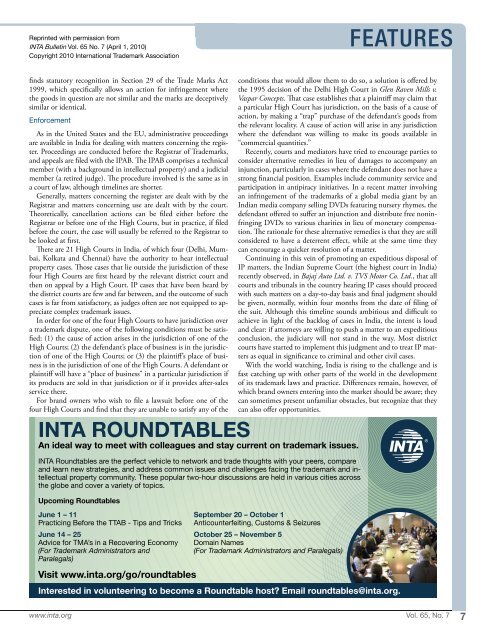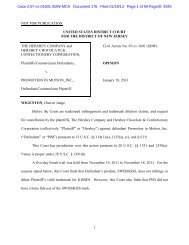Indian Trademark Law - Cowan Liebowitz and Latman P.C.
Indian Trademark Law - Cowan Liebowitz and Latman P.C.
Indian Trademark Law - Cowan Liebowitz and Latman P.C.
You also want an ePaper? Increase the reach of your titles
YUMPU automatically turns print PDFs into web optimized ePapers that Google loves.
Reprinted with permission from<br />
INTA Bulletin Vol. 65 No. 7 (April 1, 2010)<br />
Copyright 2010 International <strong>Trademark</strong> Association<br />
features<br />
finds statutory recognition in Section 29 of the Trade Marks Act<br />
1999, which specifically allows an action for infringement where<br />
the goods in question are not similar <strong>and</strong> the marks are deceptively<br />
similar or identical.<br />
Enforcement<br />
As in the United States <strong>and</strong> the EU, administrative proceedings<br />
are available in India for dealing with matters concerning the register.<br />
Proceedings are conducted before the Registrar of <strong>Trademark</strong>s,<br />
<strong>and</strong> appeals are filed with the IPAB. The IPAB comprises a technical<br />
member (with a background in intellectual property) <strong>and</strong> a judicial<br />
member (a retired judge). The procedure involved is the same as in<br />
a court of law, although timelines are shorter.<br />
Generally, matters concerning the register are dealt with by the<br />
Registrar <strong>and</strong> matters concerning use are dealt with by the court.<br />
Theoretically, cancellation actions can be filed either before the<br />
Registrar or before one of the High Courts, but in practice, if filed<br />
before the court, the case will usually be referred to the Registrar to<br />
be looked at first.<br />
There are 21 High Courts in India, of which four (Delhi, Mumbai,<br />
Kolkata <strong>and</strong> Chennai) have the authority to hear intellectual<br />
property cases. Those cases that lie outside the jurisdiction of these<br />
four High Courts are first heard by the relevant district court <strong>and</strong><br />
then on appeal by a High Court. IP cases that have been heard by<br />
the district courts are few <strong>and</strong> far between, <strong>and</strong> the outcome of such<br />
cases is far from satisfactory, as judges often are not equipped to appreciate<br />
complex trademark issues.<br />
In order for one of the four High Courts to have jurisdiction over<br />
a trademark dispute, one of the following conditions must be satisfied:<br />
(1) the cause of action arises in the jurisdiction of one of the<br />
High Courts; (2) the defendant’s place of business is in the jurisdiction<br />
of one of the High Courts; or (3) the plaintiff’s place of business<br />
is in the jurisdiction of one of the High Courts. A defendant or<br />
plaintiff will have a “place of business” in a particular jurisdiction if<br />
its products are sold in that jurisdiction or if it provides after-sales<br />
service there.<br />
For br<strong>and</strong> owners who wish to file a lawsuit before one of the<br />
four High Courts <strong>and</strong> find that they are unable to satisfy any of the<br />
conditions that would allow them to do so, a solution is offered by<br />
the 1995 decision of the Delhi High Court in Glen Raven Mills v.<br />
Vaspar Concepts. That case establishes that a plaintiff may claim that<br />
a particular High Court has jurisdiction, on the basis of a cause of<br />
action, by making a “trap” purchase of the defendant’s goods from<br />
the relevant locality. A cause of action will arise in any jurisdiction<br />
where the defendant was willing to make its goods available in<br />
“commercial quantities.”<br />
Recently, courts <strong>and</strong> mediators have tried to encourage parties to<br />
consider alternative remedies in lieu of damages to accompany an<br />
injunction, particularly in cases where the defendant does not have a<br />
strong financial position. Examples include community service <strong>and</strong><br />
participation in antipiracy initiatives. In a recent matter involving<br />
an infringement of the trademarks of a global media giant by an<br />
<strong>Indian</strong> media company selling DVDs featuring nursery rhymes, the<br />
defendant offered to suffer an injunction <strong>and</strong> distribute free noninfringing<br />
DVDs to various charities in lieu of monetary compensation.<br />
The rationale for these alternative remedies is that they are still<br />
considered to have a deterrent effect, while at the same time they<br />
can encourage a quicker resolution of a matter.<br />
Continuing in this vein of promoting an expeditious disposal of<br />
IP matters, the <strong>Indian</strong> Supreme Court (the highest court in India)<br />
recently observed, in Bajaj Auto Ltd. v. TVS Motor Co. Ltd., that all<br />
courts <strong>and</strong> tribunals in the country hearing IP cases should proceed<br />
with such matters on a day-to-day basis <strong>and</strong> final judgment should<br />
be given, normally, within four months from the date of filing of<br />
the suit. Although this timeline sounds ambitious <strong>and</strong> difficult to<br />
achieve in light of the backlog of cases in India, the intent is loud<br />
<strong>and</strong> clear: if attorneys are willing to push a matter to an expeditious<br />
conclusion, the judiciary will not st<strong>and</strong> in the way. Most district<br />
courts have started to implement this judgment <strong>and</strong> to treat IP matters<br />
as equal in significance to criminal <strong>and</strong> other civil cases.<br />
With the world watching, India is rising to the challenge <strong>and</strong> is<br />
fast catching up with other parts of the world in the development<br />
of its trademark laws <strong>and</strong> practice. Differences remain, however, of<br />
which br<strong>and</strong> owners entering into the market should be aware; they<br />
can sometimes present unfamiliar obstacles, but recognize that they<br />
can also offer opportunities.<br />
INTA ROUNDTABLES<br />
An ideal way to meet with colleagues <strong>and</strong> stay current on trademark issues.<br />
INTA Roundtables are the perfect vehicle to network <strong>and</strong> trade thoughts with your peers, compare<br />
<strong>and</strong> learn new strategies, <strong>and</strong> address common issues <strong>and</strong> challenges facing the trademark <strong>and</strong> intellectual<br />
property community. These popular two-hour discussions are held in various cities across<br />
the globe <strong>and</strong> cover a variety of topics.<br />
Upcoming Roundtables<br />
June 1 – 11<br />
Practicing Before the TTAB - Tips <strong>and</strong> Tricks<br />
June 14 – 25<br />
Advice for TMA’s in a Recovering Economy<br />
(For <strong>Trademark</strong> Administrators <strong>and</strong><br />
Paralegals)<br />
Visit www.inta.org/go/roundtables<br />
September 20 – October 1<br />
Anticounterfeiting, Customs & Seizures<br />
October 25 – November 5<br />
Domain Names<br />
(For <strong>Trademark</strong> Administrators <strong>and</strong> Paralegals)<br />
Interested in volunteering to become a Roundtable host? Email roundtables@inta.org.<br />
www.inta.org Vol. 65, No. 7 7



